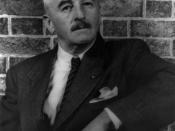A Study of the Origins of Evil'...a man's future is inherent in that man...'
Faulkner's Light in August is a metaphor. In fact it is many metaphors, almost infinitely many. It is a jumble of allusions, themes, portraits, all of them uniquely important, many of them totally unrelated. In fact no 20th century writer has even approached the sheer quantity of symbolism Faulkner packed into every page, with, perhaps, the exception of James Joyce who went so far as to surpass Faulkner in this regard. So obviously it would be foolish to attempt to trace every line, follow every branch to its root, one could spend a lifetime dissecting the book in this manner. Fortunately, in the midst of this menagerie of wonders, there are dominate themes. There are veins of meaning that permeate throughout. Chief among them; Faulkner's study of 20th century man's search for identity, and his compassionate portrait of the origins of evil.
I have come from Alabama a fur piece (Faulkner, p.3). The reader begins the book in this manner, following the simple-minded and determined Lena as she travels, neither coming nor going, simply moving. Immediately the book draws into her past, relating
events leading up to this point, explaining her motives. One gets a definite feel for her character, and settles into her narrative, but as soon as this happens, the book switches gears, turning instead to a vague character, Joe Christmas. With little introduction, or warning, the book reels into Joe's past, catching the reader totally unaware and throwing off the entire continuity of the book. Faulkner's desire for unity and coherence in the
pattern is not as strong as is his desire for truth to individual response (Reed, p.123). Thus Lena is a frame, she serves only to accentuate Christmas's story, by contrast.


